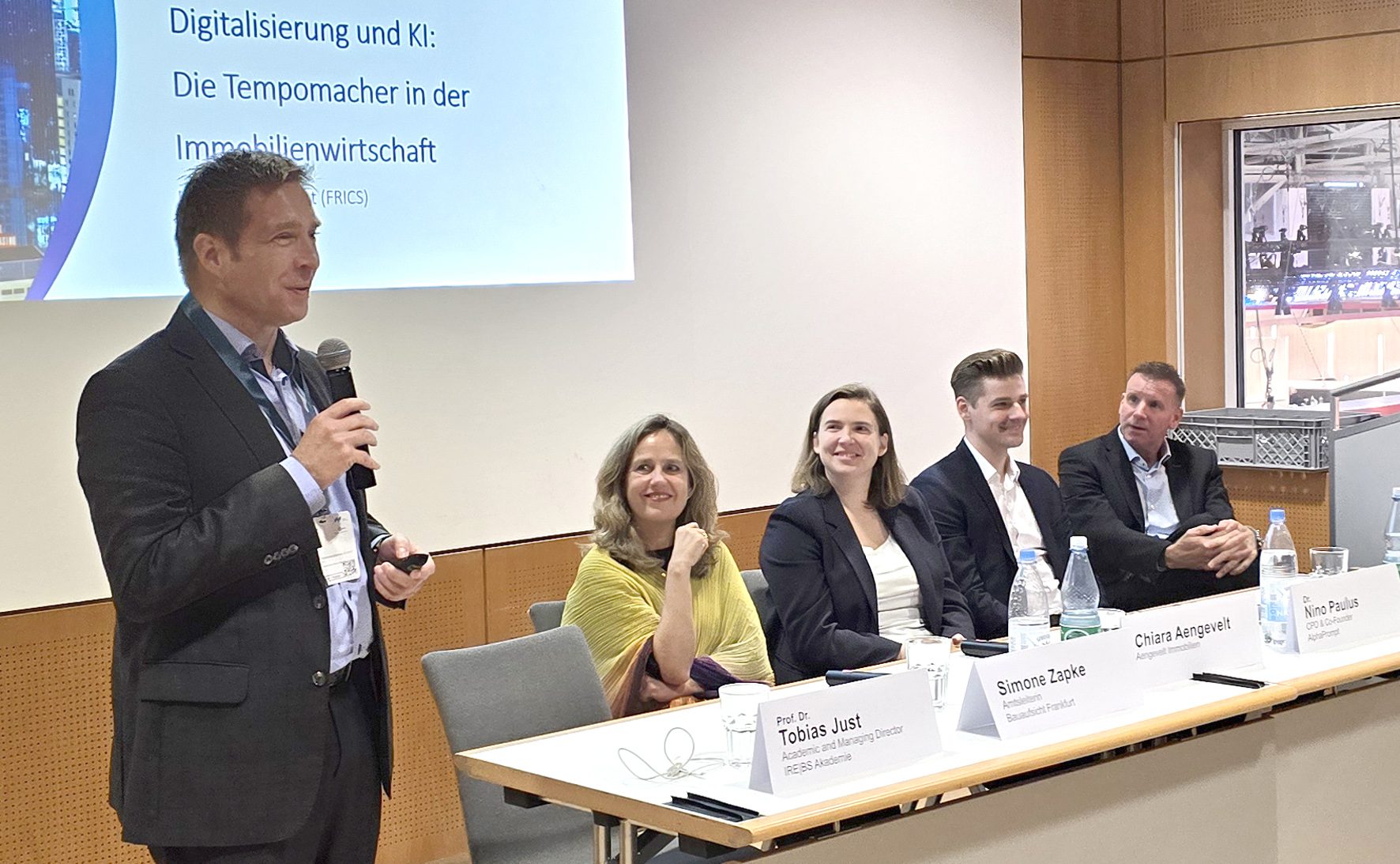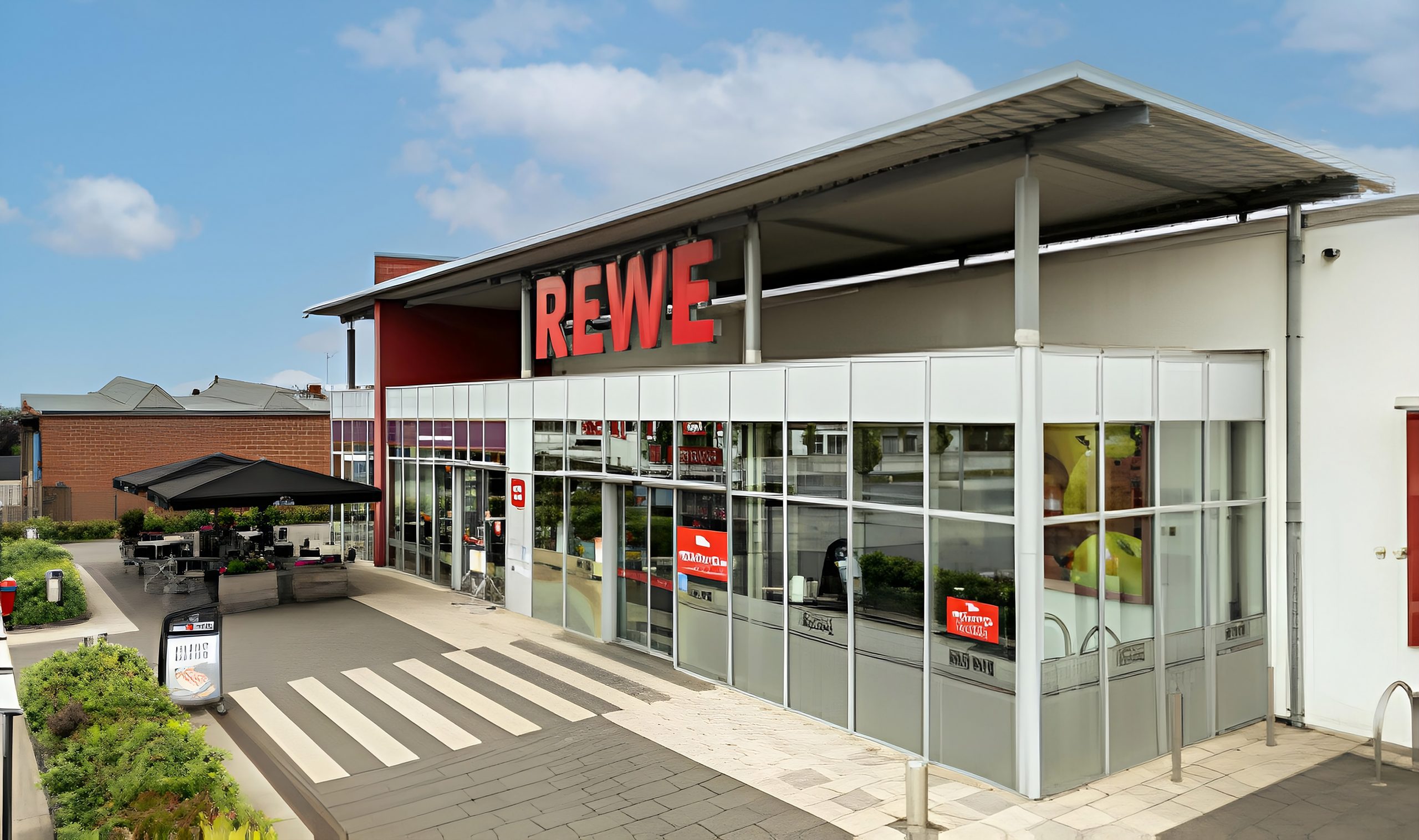“The key is in doing!” Chiara Aengevelt, Managing Partner of DIP partner Aengevelt Immobilien, summed up what a top-class panel of experts organised by the Düsseldorf-based real estate house at EXPO REAL agreed on. Artificial intelligence is a tool that not only promises high productivity gains, but can also help to develop better business models. The panel highlighted numerous facets of the topic. The most important message, however, was to start using AI immediately. This is because the real estate industry is already lagging behind in an industry comparison.

The panel discussion was opened by Prof. Dr. Tobias Just, Scientific Director and Managing Director of the IREBS Real Estate Academy. Just presented figures that not only documented the rapid development of AI, but also showed that the housing and real estate industry, the construction industry and public administration are still far behind in the development and use of AI compared to the rest of the industry. Prof. Just comments: “If you don’t run at the front, you won’t run at all soon.”
AI is suitable for compensating for the weaknesses of humans, because humans make mistakes, are slow and get tired, have emotions and act socially and randomly. On the other hand, people are intelligent and creative. It is therefore important to design the process chains in such a way that AI takes over the steps where humans are weak, so that humans can better play to their specific strengths or even turn weaknesses into strengths.
Prof. Just also presented current research results from MIT and Harvard, which show that working with AI can also worsen cognitive performance and reduce productivity, because AI tempts you to generate too many texts, graphics and presentations that then have to be processed again (“Workslop”).
For the real estate industry, this means not focusing on the automation of processes and products, but on the business models of customers. Prof. Just: “First of all, we are doing a really great property management process and then we are surprised that our office space is empty. Then we can still automate office vacancy management, but if we don’t have any use, we don’t have a business model.”
Simone Zapke, Head of the Frankfurt am Main Building Inspectorate, then explained how the administration has managed to digitize the building application process in ten years. Instead of creating an isolated solution that would have been ready in half the time, Frankfurt has decided to develop a system that can be used by all 38 building inspectorates in Hesse. However, an obsession with detail can lead to “never getting to the end”. Simone Zapke: “Digitization in the building application process is no longer a project for the future – we are showing that it makes the difference: faster, more transparent, legally compliant. If we use digitization and AI wisely, they will become a real pacemaker – for construction, administration and the urban development of tomorrow.”
Ralf Siefen, CEO of the Data Center Group, confirmed the productivity gains of no longer having to bring 30 to 50 files to the building authority, but being able to submit the documents digitally, because the need for new data centers is increasing at a rapid pace. Siefen said: “We are currently experiencing a double boost: On the demand side, the demand for data centers is growing rapidly because almost every industry is digitizing its processes, more and more digital business models are emerging, and AI applications require ever more powerful infrastructures. At the same time, digital tools and AI are fundamentally changing our own work. From AI-supported planning tools and the use of digital twins to smart monitoring and predictive maintenance in operation – intelligent systems accelerate processes, increase precision and create more energy efficiency. As a developer and provider of data center real estate, we combine these two dynamics: We provide the urgently needed infrastructure for a data-driven economy and use state-of-the-art technologies ourselves to implement projects faster, more sustainably and future-proof.”
Dr. Nino Paulus, CPO & Co-Founder of AlphaPrompt, a start-up that develops AI solutions for the real estate industry, reported that the use of AI has increased programmers’ productivity by 200% within three months. Ultimately, AI is just as much a tool as Excel once was: “It’s a tool that we give to people and then we have to see what people do with it.” Paulus pointed out that development processes must be designed flexibly in order to be able to respond to individual customer requirements and create tailor-made solutions: “Anyone looking for a prime office and renting a warehouse has made mistakes. What is clear for real estate also applies to digitization and AI: Only the right solutions bring speed – instead of detours.”
Chiara Aengevelt, managing partner of Aengevelt Immobilien, reported on the use of AI in her company, which relieves brokers of routine activities and makes it easier for them to pursue their actual tasks, namely to establish contact and network with their customers: “In practice, we see that AI already brings very concrete added value: analyses, presentations or due diligence processes are implemented faster, more precisely and in a more resource-saving way. Especially for medium-sized companies, where decision-making processes are short, these technologies can have a direct effect. The real brakes are not technical limits, but a lack of clarity in data protection and regulation that too often overruns without added value for the end customer. More pragmatism would help enormously here.”
Ralf Siefen emphasized the role of data centers for AI. Data centers not only provide processor and storage capacity, but also protect AI. Literally, Siefen said that data centers provide AI with a “feel-good program”. Siefen confirmed the experience of Aengevelt Immobilien that the energy infrastructure is currently a serious obstacle to the expansion of data centers. Even an average data center already requires between two and six megawatts of electricity, edge centers over 20 megawatts. However, the provision of the necessary electricity infrastructure for lines and substations alone requires a plethora of approval procedures, which must be carried out separately from the actual building permit procedure. The time required for these procedures is a problem that affects all cities in Germany.
In conclusion, Prof. Just once again emphasized how important it is for the real estate industry to deal with AI: “It doesn’t matter at all whether we see it as an opportunity or a risk. We should look at it like gravity. That will come. Because this will happen in China, it will happen in the USA, it will happen in Africa. We just can’t escape it. That’s why we have to deal with it and we have to have a good solution so that our companies, our citizens, but also we as a real estate industry can box with it.”
Dr. Paulus referred to the companies that deal with AI at an early stage: “You can’t see the difference to the outside world yet, but if the companies that are already doing a lot today tackle individual processes, try them out, manage to link long process chains with AI in the next one or two years, then they will become extremely much more productive overnight, much more efficient, deliver better products, cheaper products and the others will look at, okay, where can we buy this AI? All I can say is: You can’t buy them, each of us has to build them ourselves.”
Chiara Aengevelt put it in a nutshell: “The key is to do, now and not in the future. Don’t plan so much, just start and see how AI can help your business move forward!”





